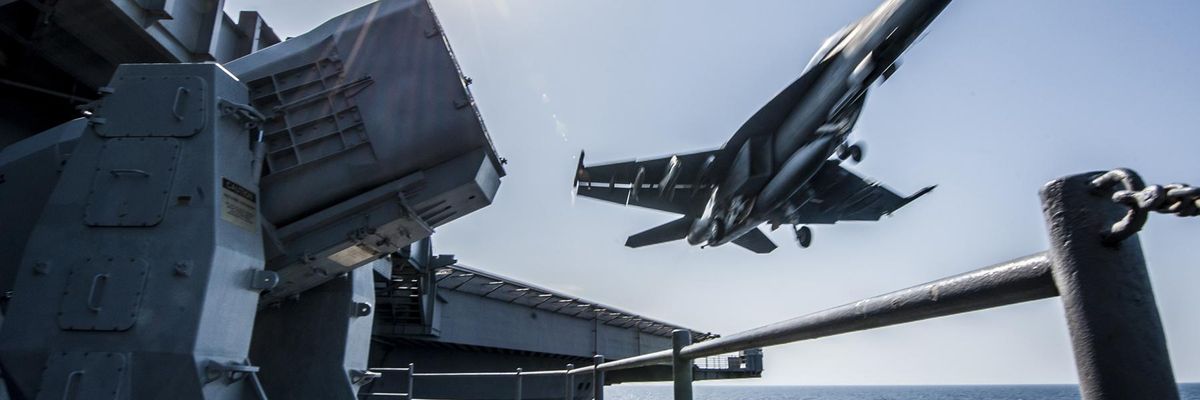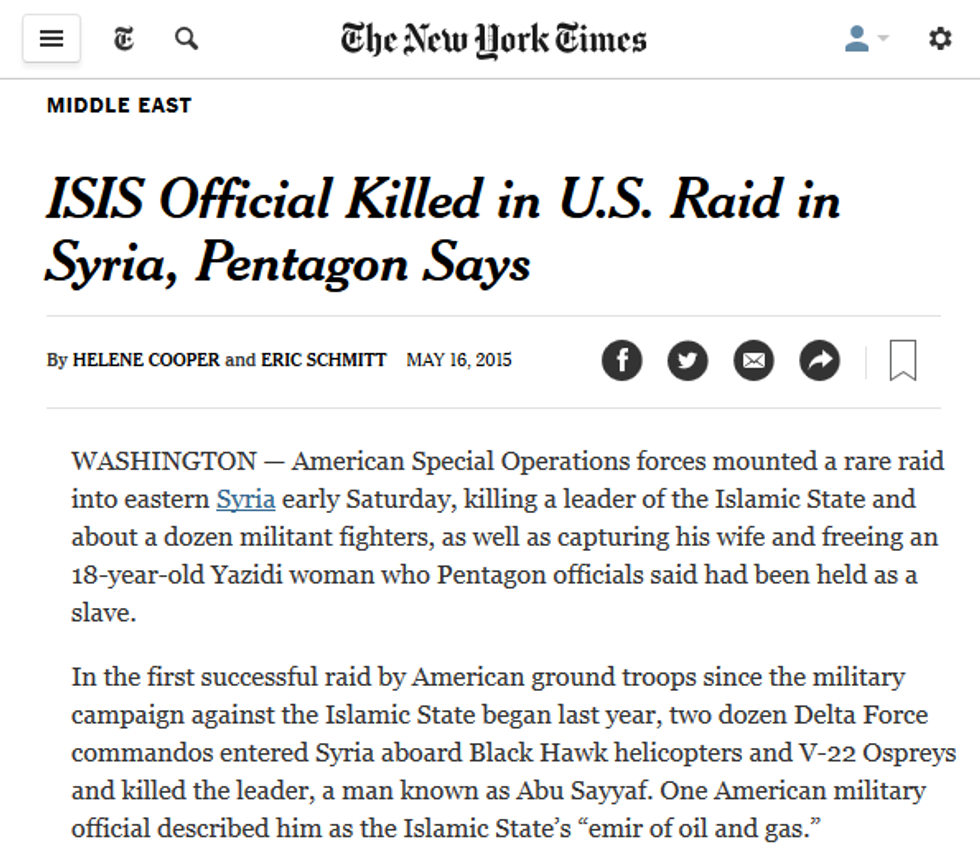

SUBSCRIBE TO OUR FREE NEWSLETTER
Daily news & progressive opinion—funded by the people, not the corporations—delivered straight to your inbox.
5
#000000
#FFFFFF
To donate by check, phone, or other method, see our More Ways to Give page.


Daily news & progressive opinion—funded by the people, not the corporations—delivered straight to your inbox.

A US warplane takes off from a US aircraft carrier to bomb targets in Syria. (Photo: Alex King/US Navy/cc)
"President Obama has long refused to approve direct military intervention in Syria," the New York Times asserted in an editorial (9/29/16) about "Vladimir Putin's Outlaw State."
"President Obama has long refused to approve direct military intervention in Syria," the New York Times asserted in an editorial (9/29/16) about "Vladimir Putin's Outlaw State."
That's a peculiar thing to say, given that the Times regularly covers the United States' ongoing direct military intervention in Syria. Since 2014, according to official Pentagon figures, the US has carried out 5,337 airstrikes in Syria. According to the monitoring group Airwars, these airstrikes (along with a few hundred strikes by US allies) have likely killed between 818 and 1,229 Syrian civilians.

Nor is direct US military intervention in Syria limited to aerial attacks. In May 2015, the New York Times (5/16/15) reported on a combat raid by US Delta Force commandos in eastern Syria. Later that year, the Times (10/30/15) observed that President Barack Obama had announced he was sending (in the paper's words) "several dozen" special forces troops on an "open-ended mission" inside Syria.
Just a couple of weeks ago, the Times (9/16/16) wrote about three dozen more special forces going to aid Turkish troops inside Syria. Officially, these will have an "advise and assist" role--but the Times (12/27/15) has elsewhere noted the frequent US practice with regard to special forces of "resorting to linguistic contortions to mask the forces' combat role."
The Times, for its part, is engaging in some kind of linguistic contortion of its own to make none of this qualify as "direct military intervention in Syria." Presumably it has something to do with the airstrikes and special forces not being aimed at the Syrian government of Bashar Assad, but at the Islamic State in Iraq and Syria, or ISIS--a rival to Assad's power in Syria that the US is semi-officially at war with, even as Washington provides arms and training to other armed groups trying to overthrow Assad.
Trump and Musk are on an unconstitutional rampage, aiming for virtually every corner of the federal government. These two right-wing billionaires are targeting nurses, scientists, teachers, daycare providers, judges, veterans, air traffic controllers, and nuclear safety inspectors. No one is safe. The food stamps program, Social Security, Medicare, and Medicaid are next. It’s an unprecedented disaster and a five-alarm fire, but there will be a reckoning. The people did not vote for this. The American people do not want this dystopian hellscape that hides behind claims of “efficiency.” Still, in reality, it is all a giveaway to corporate interests and the libertarian dreams of far-right oligarchs like Musk. Common Dreams is playing a vital role by reporting day and night on this orgy of corruption and greed, as well as what everyday people can do to organize and fight back. As a people-powered nonprofit news outlet, we cover issues the corporate media never will, but we can only continue with our readers’ support. |
"President Obama has long refused to approve direct military intervention in Syria," the New York Times asserted in an editorial (9/29/16) about "Vladimir Putin's Outlaw State."
That's a peculiar thing to say, given that the Times regularly covers the United States' ongoing direct military intervention in Syria. Since 2014, according to official Pentagon figures, the US has carried out 5,337 airstrikes in Syria. According to the monitoring group Airwars, these airstrikes (along with a few hundred strikes by US allies) have likely killed between 818 and 1,229 Syrian civilians.

Nor is direct US military intervention in Syria limited to aerial attacks. In May 2015, the New York Times (5/16/15) reported on a combat raid by US Delta Force commandos in eastern Syria. Later that year, the Times (10/30/15) observed that President Barack Obama had announced he was sending (in the paper's words) "several dozen" special forces troops on an "open-ended mission" inside Syria.
Just a couple of weeks ago, the Times (9/16/16) wrote about three dozen more special forces going to aid Turkish troops inside Syria. Officially, these will have an "advise and assist" role--but the Times (12/27/15) has elsewhere noted the frequent US practice with regard to special forces of "resorting to linguistic contortions to mask the forces' combat role."
The Times, for its part, is engaging in some kind of linguistic contortion of its own to make none of this qualify as "direct military intervention in Syria." Presumably it has something to do with the airstrikes and special forces not being aimed at the Syrian government of Bashar Assad, but at the Islamic State in Iraq and Syria, or ISIS--a rival to Assad's power in Syria that the US is semi-officially at war with, even as Washington provides arms and training to other armed groups trying to overthrow Assad.
"President Obama has long refused to approve direct military intervention in Syria," the New York Times asserted in an editorial (9/29/16) about "Vladimir Putin's Outlaw State."
That's a peculiar thing to say, given that the Times regularly covers the United States' ongoing direct military intervention in Syria. Since 2014, according to official Pentagon figures, the US has carried out 5,337 airstrikes in Syria. According to the monitoring group Airwars, these airstrikes (along with a few hundred strikes by US allies) have likely killed between 818 and 1,229 Syrian civilians.

Nor is direct US military intervention in Syria limited to aerial attacks. In May 2015, the New York Times (5/16/15) reported on a combat raid by US Delta Force commandos in eastern Syria. Later that year, the Times (10/30/15) observed that President Barack Obama had announced he was sending (in the paper's words) "several dozen" special forces troops on an "open-ended mission" inside Syria.
Just a couple of weeks ago, the Times (9/16/16) wrote about three dozen more special forces going to aid Turkish troops inside Syria. Officially, these will have an "advise and assist" role--but the Times (12/27/15) has elsewhere noted the frequent US practice with regard to special forces of "resorting to linguistic contortions to mask the forces' combat role."
The Times, for its part, is engaging in some kind of linguistic contortion of its own to make none of this qualify as "direct military intervention in Syria." Presumably it has something to do with the airstrikes and special forces not being aimed at the Syrian government of Bashar Assad, but at the Islamic State in Iraq and Syria, or ISIS--a rival to Assad's power in Syria that the US is semi-officially at war with, even as Washington provides arms and training to other armed groups trying to overthrow Assad.